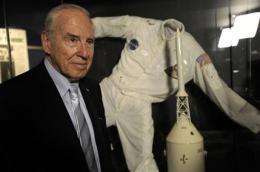Apollo 13 crew member Commander James A. Lovell, Jr. poses with his space suit during a 40th Anniversary reunion of the moon mission at the Adler Planetarium Monday, April 12, 2010, in Chicago. (AP Photo/Paul Beaty)
(AP) -- Surviving Apollo 13 astronauts and several flight directors reunited on Monday to remember a failed moon mission 40 years ago this week that they managed to turn into one of the greatest triumphs in the history of space exploration.
Those who gathered included Apollo 13 commander James Lovell, fellow crew member Fred Haise and NASA's legendary flight director, Gene Kranz - all three of whom were immortalized in the 1995 movie "Apollo 13," which starred Tom Hanks as Lovell.
"There's truly a unique bond. There is a brotherhood," Kranz said about how the crisis forged a lifelong bond between everyone involved.
The Adler Planetarium, where the reunion took place, is holding a series of events this month commemorating the Apollo 13 flight. One exhibit includes a lunar helmet and gloves that Lovell was supposed to wear on the moon had the mission gone as planned.
On April 13, 1970, an oxygen tank exploded as the spaceship was four-fifths of the way to the moon. The crew, which included Jack Swigert, who died in 1982, was forced to scrap the moon mission and focus solely on getting back to Earth alive.
Lovell's calm if unsettling words to Mission Control following the explosion that, "Houston, we've had a problem" - now widely recited as, "Houston, we have a problem" - belied his quick internal calculation that their chances of survival were slim.
"But you don't put that in your mind," he said Monday. "You don't say how slim they are but rather how you can improve the odds."
In Houston, Kranz led hundreds of flight controllers and engineers in a furious rescue plan. He insisted on Monday that he never allowed himself to believe that the plan could fail.
Still, he quickly added, "there is some point when you do the best you can and then it's up to a higher authority to steer this mission to its ultimate conclusion."
The plan involved the crew members moving from the service module, which was hemorrhaging oxygen, into the cramped, frigid lunar lander while they rationed their dwindling oxygen and electricity. Using the lunar module as a lifeboat, they swung around the moon and aimed for Earth.
In the process of turning what seemed routine into a life-and-death struggle, the entire flight team had created one of NASA's finest moments, ranking with Neil Armstrong and Buzz Aldrin's walks on the moon.
In 1994, Lovell and Jeff Kluger wrote "Lost Moon," the story of the Apollo 13 mission and the basis for the movie. The movie, Lovell and Kranz concede, helped renew the public's interest in Apollo 13 at a time when it had started to fade.
Kranz, who was played by actor Ed Harris in the movie, said Hollywood provided a largely accurate account of what happened. The one thing he took issue with was his character sometimes raising his voice in the control room.
"The fact is, controllers very seldom raise their voices, not in that control room," he said. "If you lose your temper, people recognize it and they start (thinking) that you are closer to the edge then you really are."
More information: Adler Planetarium: http://www.adlerplanetarium.org
©2010 The Associated Press. All rights reserved. This material may not be published, broadcast, rewritten or redistributed.



















